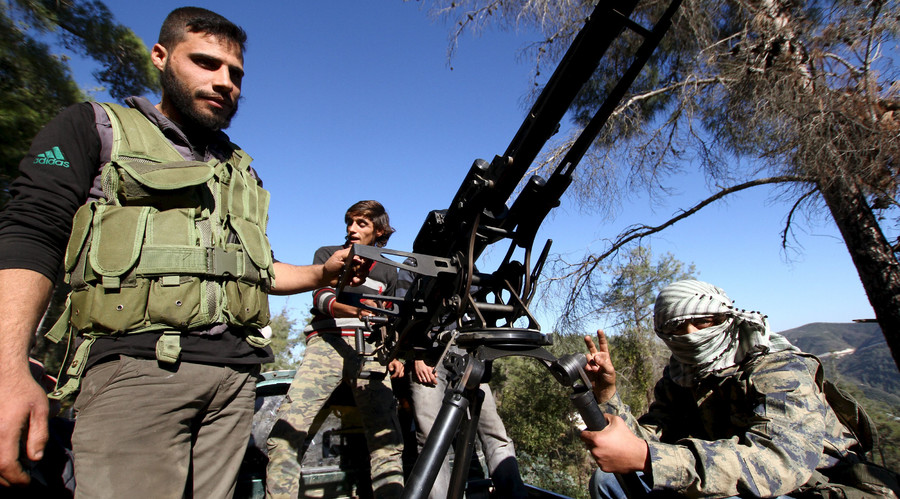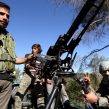
Importance of Syrian Turkmen to Turkey
Publication: Eurasia Daily Monitor Volume: 13 Issue: 38
By:

War-torn Syria is days away from the start of a negotiated partial ceasefire, which is supposed to temporarily end fighting between rebel groups and government forces supported by Russian supplies and bombing sorties. The ceasefire, agreed to by Russian Foreign Minister Sergei Lavrov and his United States counterpart, Secretary of State John Kerry, excludes any continued targeting of recognized terrorist groups, including the Islamic State and Jabhat al-Nusra. Serious questions remain about whether the partial ceasefire can last; but if effective and properly enforced, the halt in hostilities could provide much-needed respite for US- and Turkish-backed rebel groups fighting in northwestern Syria that were being pounded by Russian bombers for weeks (Albawaba News, February 24).
For Turkey, the nearby regions of Bayırbucak and Aleppo in Syria’s northwest corner, are places of strategic importance. And Moscow’s indiscriminate targeting of the Turkish-backed Syrian National Coalition troops fighting there—even in the midst of the last (third) round of abortive Geneva peace talks (January 29–February 2)—has particularly incensed Ankara. According to information provided by Turkey’s Prime Ministry Disaster and Emergency Management Authority (AFAD), approximately three thousand people took refuge in Turkey as a result of Russian-Syrian operations in Bayırbucak, which occurred in the middle of the third Geneva talks (Bugün, February 1).
The Bayırbucak region, populated by Syrian Turkmen, consists of two defined parts: Bayır and Bucak. While Bayır covers the mountainous area surrounding Turkmen Mountain, Bucak is composed of a group of Syrian villages located close to the Mediterranean coast. In Bucak, there are 21 villages and a hamlet, while Bayır includes 22 villages and 35 hamlets. Bayırbucak’s local Syrian Turkmen population numbered around 250,000 before the Arab Spring, but the remaining population there is unknown (Anadolu Agency, February 5).
The Bayırbucak area, adjacent to the important border town of Yayladagi, in Turkey’s Hatay province, is a strategically important geographic region for Turkey. First, Bayırbucak is populated by local Turkmen, who make up an important opposition force to the al-Assad regime. If Turkmen and other opposition forces were able to seize full control of the entire Bayirbucak region from the Syrian government, they would be able to secure access to the Mediterranean as well as open up a corridor for rebel forces to march on the important regime stronghold of Latakia. Conversely, the complete loss of this area would revert Syria’s northwest corner—particularly Idlib province, which borders on Turkey—back into the hands of the al-Assad regime, thus closing a vital humanitarian corridor to Syria via Turkey (Anadolu Agency, February 5). Additionally, the Turkmen’s ability to hold onto their territory in northwest Syria is crucial for Ankara because they form a barrier between the Turkish border and areas controlled by Syrian Kurdish groups (Aksham, January 10). Finally, it bears pointing out that the public in Turkey is sensitive about the plight of the Syrian Turkmen due to the ethnic and cultural ties between them.
The continued role of the Syrian Turkmen in their country’s civil war is an important factor affecting Turkey’s foreign and military policy calculations regarding Syria. Indeed, prior to the deadly incident involving the downing of a Russian Su-24 jet that violated Turkish airspace, one of the reasons contributing to the deterioration in Turkish-Russian relations last year was Russia’s continued aerial bombing attacks against Syrian Turkmen forces in Bayırbucak (see EDM, December 3, 2015).
Two armed Turkmen units are simultaneously fighting in Syria against the Islamic State and al-Assad’s army: the “Sultan Murad” Brigades, operating in Aleppo and Bayırbucak, and a coastal armed formation in Lazkiye (Latakia). Both units are being closely supported by Turkey. In an interview with this author, Syrian Turkmen Assembly President Abdurrahman Mustafa noted, “The Turkmen troops in Aleppo—the Sultan Murad division [sic]—have been putting up an important fight against ISIS [the Islamic State in Iraq and Syria—a former name for the Islamic State militant group] and the al-Assad regime. We are fighting with all our strength to clean our Turkmen villages under ISIS’s control of those terrorists. During this period, the moderate opposition [the Syrian National Coalition], of which we are a component, has been receiving international support. In the latest operation [January 10], in which we took the Turkmen villages [near Aleppo] of Karaköprü, Karamezra, Kızıl and Harava back from ISIS, Turkey backed our troops, within the rules of engagement, with artillery barrages” (Author’s interview, January 13; (Hurriyet Daily News, January 10).
In supporting the moderate opposition in Syrian politics, Turkey is paying particular attention to the Turkmen forces on the battlefield to make sure they maintain control over their territories. It was, therefore, particularly important to Turkey that the fighting Syrian Turkmen units join the Syrian secular opposition forces. Indeed, this was a topic of discussion between Turkish President Recep Tayyip Erdoğan and the Syrian Turkmen Assembly’s leader, Abdurrahman Mustafa, during their meeting in Istanbul, on January 8. And despite a last-minute invitation, Mustafa represented the Syrian Turkmen forces during the third Geneva peace talks (TRT World, January 26; Daily Sabah, February 2).
Following the last Geneva talks, which ended on February 2 without any sort of breakthrough, regime forces militarily seized much of Bayırbucak from armed Syrian Turkmen groups. But other opposition units who came to help the Turkmen have maintained the fight against the government. As of February 12, Turkmen forces still controlled four Bayırbucak villages, according to Abdurrahman Mustafa (Author’s interview, February 12). The total loss of control of this strategic territory on Turkey’s border to al-Assad’s regime would mean a serious setback for Ankara’s political goals in Syria, and the next few weeks will show how the partial ceasefire changes the present situation on the ground.




